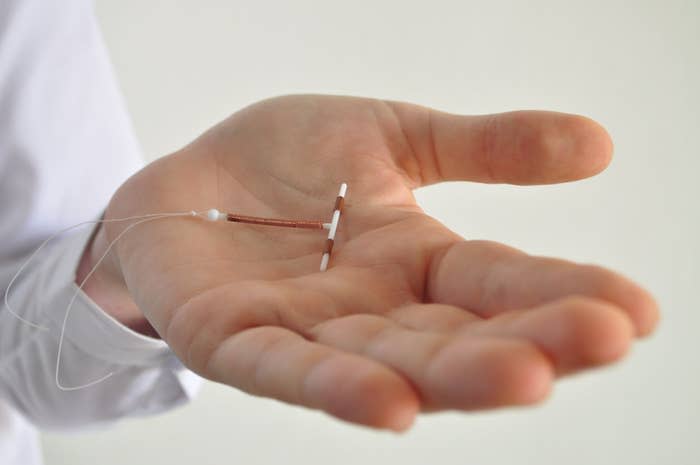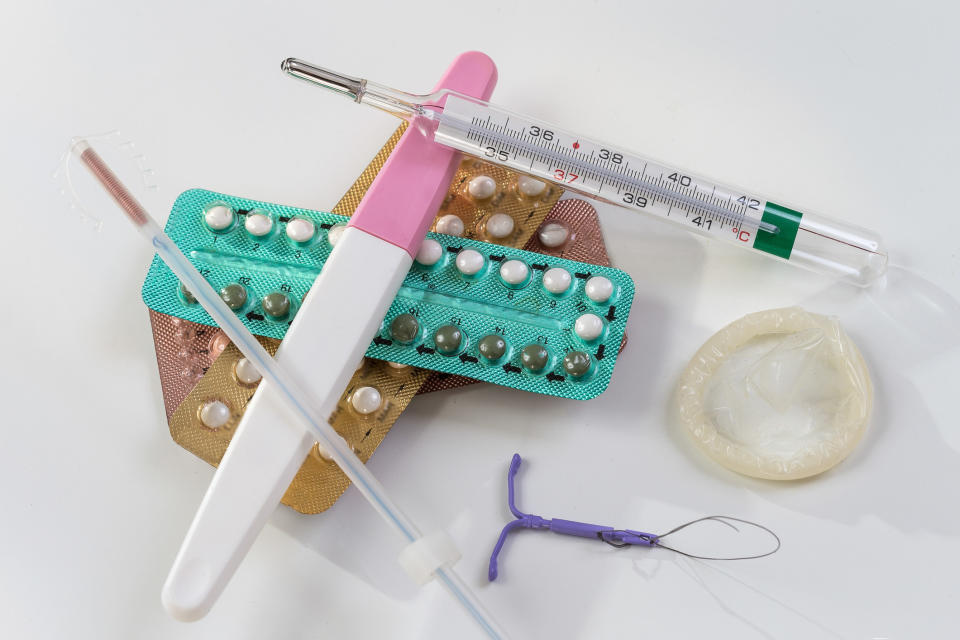People Are Sharing Their Experiences Getting An IUD After This Woman Said She Felt Like She "Went Into Labor" Getting One Inserted
Holly Smallwood is a woman who has experienced what childbirth contractions feel like, even though she's never been pregnant.
In a TikTok, she discussed her traumatic IUD insertion — which ended in an IUD removal:
@hollyyywood_ single-handedly the most physically traumatic 45 minutes from start to finish lmao
? original sound - Holly Smallwood
In 2020, Holly decided to get the copper IUD, and while being monitored after insertion (which is standard procedure), she told her nurse that her pain was getting increasingly worse. "I was like, 'Is the pain normally this bad, because I'm feeling these weird things?' She was like, 'Yeah, just give it a few more minutes. It's settling.' She comes back five minutes later and I'm like, 'Give me a bag, I'm going to throw up.' I started vomiting and I started to see black and I pass out within the next five minutes," Holly said in her TikTok, which has been viewed by over 1.3 million people.

This is when Holly says "all hell breaks loose." She continues on TikTok, "My extremities went numb. I couldn't feel my legs. I couldn't feel my arms. I'm sweating profusely. The nurse is progressively looking a little more concerned, but she's also like, 'You know some people just tolerate pain differently'...like 'we've seen things like this before.' And then I start to feel something that I've only ever heard explained in movies. I don't even know how I knew what it was, but I knew that I was having contractions."

After things kept getting increasingly painful for Holly, her doctor made the decision to remove the IUD. "She does an emergency extraction and once I can finally breathe again, I'm like, 'What the fuck just happened?' It had gotten placed on a nerve and it sent me into labor. My body was trying to push it out. So I was multi centimeters dilated. She said I would have already had an epidural if I was pregnant."

There were an alarming amount of people who rushed to the comments to share similar IUD experiences:



And several doctors used this as an example to raise awareness about how detrimental the dismissal of women's pain can be. Dr. Kunal Sood — who is double board certified in anesthesiology and interventional pain medicine — made a reaction video to Holly's story, and it has been viewed over 16 million times:
@doctorsood #duet with @hollyyywood_ Great story for healthcare providers to learn from. Diagnosing the underlying cause of pain is critical. #womenshealth #iud #iudinsertion
? original sound - Holly Smallwood
"The insertion [of an IUD] can be quite painful and has even traumatized a subset of patients. As a doctor who did residency in anesthesiology, this is disheartening to hear because minimizing a patient’s procedure pain should always be a priority," he told BuzzFeed.
"If you read the comments, thousands of women feel their pain during IUD insertions is not taken seriously. Any procedure will have risks associated with it, but our job as doctors is to minimize that risk and, when there are signs of complications, to take them seriously," Dr. Sood said.

"An IUD may be a great option for birth control for some patients. But unfortunately, thousands of women have commented on my videos with their stories about the insertion procedure being extremely painful. Many did not receive any anesthesia, including local anesthesia, at all. This is surprising to me, since there is research that shows IUD insertion is far less painful when local anesthesia is administered," he said.
BuzzFeed spoke to Holly to get more insight into her experience. She was not offered numbing or anesthetic before the IUD procedure.
And about 10 minutes after the insertion, Holly experienced what she describes as the most painful experience of her life. "For context, I've experienced ruptured ovarian cysts, had an emergency appendectomy, and broken my left arm. I'd go through any of those things again over what happened that day with my attempt at an IUD."

She had to endure the contractions for about 20 minutes before the doctor was finally called in to examine her. "I very clearly remember the doctor doing an emergency extraction of the IUD and the IMMEDIATE relief that followed. The removal just felt like a pinch and then a whole body release. I had a few minutes of shaking and two to three more short contractions before my body returned to normal as if nothing had ever happened," she said.

Holly said she is not angry about what happened, nor does she have any anger or resentment toward her doctor or the medical staff at the time. "I believe that seeing women in excruciating pain after IUD insertion is simply so common and normalized to medical professionals that my nurse didn't see anything out of the ordinary or an immediate need for anything to be checked."

"Because our bodies were designed to menstruate and give birth, we are treated as though anything that occurs or hurts during procedures involving our reproductive system is just 'part of the process.' It's unacceptable that our tolerance for pain is expected to be different than that of a man, and also unacceptable that we aren't warned about the possible outcomes of these procedures before making the decision to undergo them," she added.
We also spoke to board certified OBGYN Dr. Fatima Daoud Yilmaz to learn more about IUDs and possible complications that can arise during insertion.
"Anything that irritates the uterus — be it an IUD, a menses, a growing pregnancy, an infection, labor, etc. — can cause the uterine muscle to contract," Dr. Daoud Yilmaz said. "This signal is carried by a complex group of nerve fibers in the pelvis to the brain and is interpreted as pain. Significant stress or pain can lead to a phenomenon called a vasovagal reaction. This is a response when your heart races, your blood pressure drops, and you feel lightheaded. Some people experience visual changes, sweating, or fainting."

Because of this, Dr. Daoud Yilmaz believes that this experience would have been possible regardless of the IUD's placement. "The nerve signal is activated simply through manipulation of the uterus, whether an IUD is placed properly or not. A vasovagal reaction cannot be predicted or prevented," she said.

"As with any medical procedure or new contraceptive, the most important thing a person should be aware of are the risks, benefits, and alternatives. This absolutely must include a discussion about pain control options. Only then can a person make an informed choice that they feel is right for them. If your provider makes you feel rushed, pressured, or dismisses your questions during such a vitally important conversation, that is a huge red flag," Dr. Daoud Yilmaz said.
Dr. Daoud Yilmaz said IUDs are a highly effective, long-lasting reversible contraception. There is no single IUD (or any form of contraception, for that matter) that is universally better than the others, though certain medical conditions may warrant one over the other, according to her.
@doctordaoud Replying to @itsmeskash Did you know that you have rights? #iud #iudinsertion
? original sound - jmcglll
"For example, we have good evidence that the Mirena and copper IUDs can be placed as a method of emergency contraception, and their effectiveness does not depend on the user's weight. Hormonal IUDs have non-contraceptive benefits as well, including treatment of heavy menses, painful menses, endometriosis, and uterine pre-cancers (called endometrial intraepithelial neoplasia). The copper IUD is an excellent contraceptive option for those with a history of hormone-sensitive cancers, such as some types of breast cancer. This woman's experience could have happened with any IUD, because it's not the type, rather the experience of placement, that triggered her response."
"Cramping is a side effect commonly experienced after IUD insertion. Certain IUDs, such as the copper IUD, have the side effect of making periods generally heavier and crampier. While this is not everyone's experience, hormonal IUDs, with time, generally make periods lighter, less painful, or even absent," she added.
@doctordaoud Helping a person choose the right form of #birthcontrol is all about asking the right questions about their lifestyle and preferences.
? Say So (Instrumental Version) [Originally Performed by Doja Cat] - Elliot Van Coup
